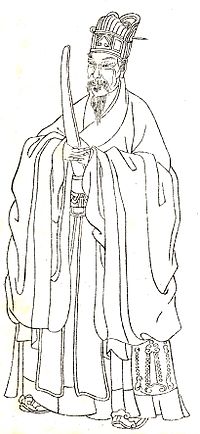Liu Bowen
| Liu Ji | |
|---|---|

A portrait of Liu Ji in a 1921 Chinese publication
|
|
| Statesman of the Ming dynasty | |
| Born | 1 July 1311 |
| Died | 16 May 1375 (aged 63) |
| Names | |
| Traditional Chinese | 劉基 |
| Simplified Chinese | 刘基 |
| Pinyin | Liú Jī |
| Wade–Giles | Liu Chi |
| Courtesy name | Bowen (simplified Chinese: 伯温; traditional Chinese: 伯溫; pinyin: Bówēn; Wade–Giles: Po-wen) |
| Posthumous name | Wencheng (Chinese: 文成; pinyin: Wénchéng; Wade–Giles: Wen-ch'eng) |
Liu Ji (July 1, 1311 — 16 May 1375),courtesy name Bowen, better known as Liu Bowen, was a Chinese military strategist, statesman and poet who lived in the late Yuan and early Ming dynasties. He was born in Qingtian County (present-day Wencheng County, Wenzhou, Zhejiang). He served as a key advisor to Zhu Yuanzhang (the Hongwu Emperor), the founder of the Ming dynasty, in the latter's struggle to overthrow the Yuan dynasty and unify China under his rule. Liu is also known for his prophecies and has been described as the "Divine Chinese Nostradamus". He and Jiao Yu co-edited the military treatise known as the Huolongjing (Fire Dragon Manual).
Liu served Zhu Yuanzhang in his rebellion against the Mongol-led Yuan dynasty in China, which had ruled since the conquest of the Southern Song dynasty in 1279. He dabbled in many fields of statecraft, philosophy, scholarly works, and technology. His philosophical outlook was that of a skeptical naturalist, and he became interested in astronomy, calendrical science, magnetism, and fengshui. He was known to be a friendly associate of the mathematician and alchemist Zhao Yuqin, and collaborated with the contemporary general and scholar Jiao Yu to edit and compile the military-technology treatise of the Huolongjing, which outlined the use of various gunpowder weapons. He was very interested in the latter, and once said that "thunder is like fire shot from a cannon".
...
Wikipedia
